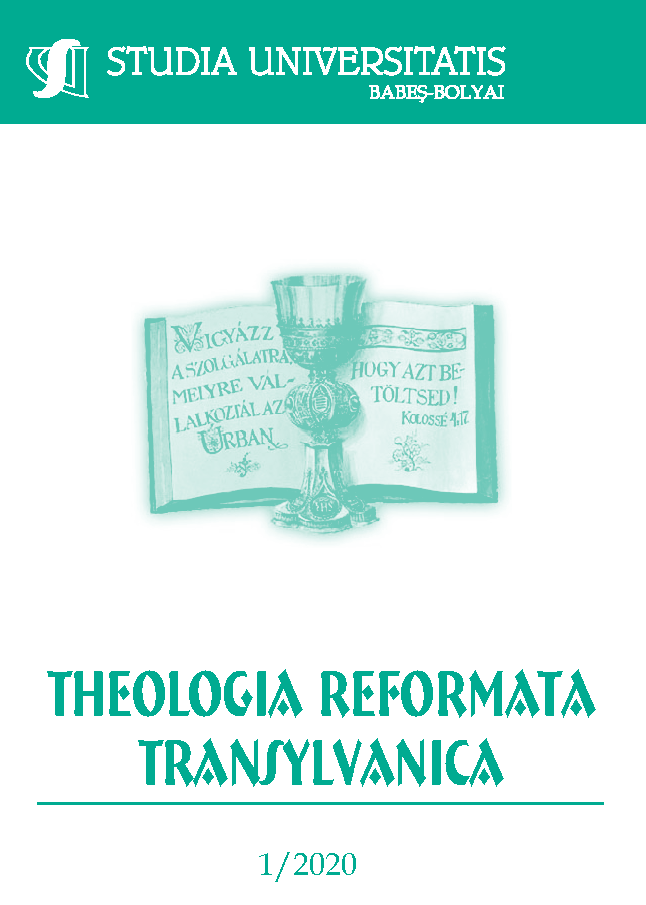Hogy az elidegenedettek visszataláljanak önmagukhoz és egymáshoz
DOI:
https://doi.org/10.24193/subbtref.65.1.10Keywords:
estrangement, alienating structures, loss of self-awareness, ideal-self and self-ideal, impact of media on family, holarchic world model, part-whole (holon), family as middle layer, relational anthropology, relational ethics, reconnecting with ourselves and with each otherAbstract
So that the estranged ones may find their way back to themselves and each other...
This study deals with the phenomenon of estrangement, which determines intimate (marital, family) relationships to a significant extent. Alienation is seen as a concealed form of intra-personal and interpersonal restlessness. This phenomenon is not resolved by the reconciliation (which is the subject of the current volume). Alienation is eliminated when one finds his way back to himself (again) or when people find their way back to each other (again). Following the introduction (1), the current article discusses the social manifestations of estrangement based on a study by Peter V. Zima (2). This section addresses estrangement as a social phenomenon, as well as the impact of its structures on marital and family relationships. From the perspective of social sciences, the present and the future of intimate relationships reveals a worrying picture. Starting from this observation, the study seeks a conceptual basis that, while not explicitly theological, has solid theological foundations, strong enough to offer support for building marital and family relationships, which are seriously affected by social processes. Elements of this can be found in the holarchic world model translated into human sciences by Rudy Vandamme (3), as well as in the contextual approach of Iván Böszörményi-Nagy (4). The basic ideas of this world model and approach help us to establish a foundation that allows marital and family relationships not to become victims of social alienation structures, but to be-come places where people can find their ways back to themselves and each other. The conclusion (5) formulates the well-founded hope that intimate relation-ships have a positive radiation and effect upon society, and as runways to relational ethics enable the coming generation to actively shape the emerging relational and social life.
References
BARTH, Karl: Die Kirchliche Dogmatik. Dritter Band. Die Lehre von der Schöpfung. Zweiter Teil, Evangelischer Verlag A. G. Zollikon, Zürich, 1948.
BOSZORMENYI-NAGY, Ivan– KRASNER, Barbara R.: Between Give and Take. A Clinical Guide to Contextual Therapy, Brunner/Mazzel Publishers, New York, 1986.
KISS Jenő: A csomópont-létezés és velejárói, in: Theológiai Szemle, 2019. 04(2019). 229–234.
KISS Jenő: Kire néz a lelkigondozás és mi a célja, in: LITERÁTY Zoltán: Quoniam tecum est fons vitae in lumine tuo videbimus lumen, Károli Gáspár Református Egyetem–L’Harmattan Kiadó, Budapest, 2018. 29–41.
KISS Jenő: Egzisztenciális vétek, egzisztenciális adósság, in: Embertárs, 14.1 (2018). 49–61.
KOESTLER, Arthur: The Ghost in the Machine, Hutchinson, London, 1976.
KRASNER, Barbara – JOYCE, Austin: Az odaadó elköteleződés elemei, in: MICHIELSEN, May – VAN MULLINGEN, Wim – HERMKENS, Leen (szerk.): Összetartozásban. A kontextuális segítésről, Exit Kiadó, Kolozsvár, 2010. 63-98.
MEULINK-KORF, Hanneke – VAN RHIJN, Aat: A harmadik - akivel nem számoltak, Exit Kiadó, Kolozsvár, 2009.
MICHIELSEN, May – VAN MULLINGEN, Wim – HERMKENS, Leen (szerk.): Összetartozásban. A kontextuális segítésről, Exit Kiadó, Kolozsvár, 2010.
MICHIELSEN, May: Bizalom és megbízhatóság a párkapcsolati terápiában, in: MICHIELSEN, May – VAN MULLINGEN, Wim – HERMKENS, Leen (szerk.): Összetartozásban. A kontextuális segítésről, Exit Kiadó, Kolozsvár, 2010. 165–192.
NIEBUHR, Karl-Wilhelm: Grundinformation Neues Testament, Vandenhoeck & Ruprecht, Göttingen, 2003.
RICOEUR, Paul: Soi-même comme un autre, Paris, Seuil, 1990.
SCHNELLE, Udo: Einleitung in das Neue Testament, Vandenhoeck & Ruprecht, Göttingen, 2005.
VAN MIERLO, F. – MICHIELSEN, M. – DE BUYSSER, M – ROOIJAKKERS-SEGERS, G.: Megfelelően adni és elfogadni, in: MICHIELSEN, May – VAN MULLINGEN, Wim – HERMKENS, Leen (szerk.): Összetartozásban. A kontextuális segítésről, Exit Kiadó, Kolozsvár, 2010. 101–132.
ZIMA, Peter V.: Entfremdung, Pathohologien der postmodernen Gesellschaft, A. Francke Verlag Tübingen, Tübingen, 2014.
VAN RHIJN, Aat – MEULINK-KORF, Hanneke: De Context en de Ander. Nagy herlezen in het spoor van Levinas met het oog op pastoraat, Uitgeverij Boekencentrum, Zoetermeer, 2001.
VANDAMME, Rudy: De Ontwikkelcirkel. Handboek Ontwikkelingsgericht Coachen van Teams, Een uitgave van het Ontwikkelingsinstituut, Ramsel, 2013.
WILBER, Ken: Integral Psychology Consciousness, Spirit, Psychology, Therapy, Shambhala Publications, Boston, 2000.
Downloads
Published
How to Cite
Issue
Section
License
Copyright (c) 2020 Studia Universitatis Babeș-Bolyai Theologia Reformata Transylvanica

This work is licensed under a Creative Commons Attribution-NonCommercial-NoDerivatives 4.0 International License.






